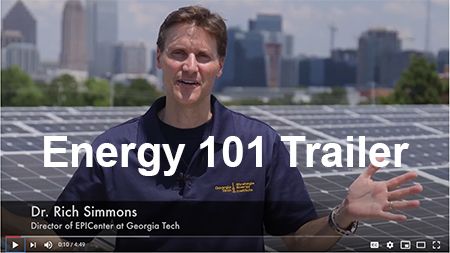Energy 101 Education Modules
A Regional Energy Literacy and Outreach Tool
Preview trailer video now available!
 Background and Motivation: This project will provide targeted new content for the existing Energy 101 Massive Online Open Course (MOOC), developed by SEI. Initially launched in 2012, the course provides a big picture perspective on energy systems, resources, economics, policy, and technology fundamentals to a general audience. To date, more than 14,000 learners have accessed its content, with more than 1,000 completing the entire 40 modules.
Background and Motivation: This project will provide targeted new content for the existing Energy 101 Massive Online Open Course (MOOC), developed by SEI. Initially launched in 2012, the course provides a big picture perspective on energy systems, resources, economics, policy, and technology fundamentals to a general audience. To date, more than 14,000 learners have accessed its content, with more than 1,000 completing the entire 40 modules.
New material will be produced with a specific focus on the Southeast Region in terms of the current and future energy resource mix with a particular focus on the region’s resource diversity, as well as regional CO2 and emissions trends. Demand characteristics of the region’s energy sector will also be included, and touch on major demand sectors (including electricity consumption and transportation). Additional content will introduce the socio-environmental impacts of using various forms of energy and estimated social costs of energy externalities, a review of benefits/costs/risks associated with the region’s energy options, efficiency considerations, and the region’s outlook for long-term energy planning.
Scope, objectives and key elements: The deliverables include a series of web-based video seminars, supporting resources and regional energy awareness outreach campaigns. Course content and modules include:
1. Overview module: Aims and scope of this mini MOOC
2. Module on electricity generation in the Southeast
a. Resource mix, supply matrix
b. Value of diversity
c. Major trends
3. Module on energy demand in the Southeast
a. Electricity by sector (industrial, commercial, residential)
b. Petroleum Consumption
c. Buildings and Vehicles
d. Demand side management, including energy efficiency options for the Southeast
4. Technology showcase (notable research, and demonstration projects in the region)
5. Socio-environmental Impacts
6. Energy economics (comparative prices for electricity, costs by type of adding new supply)
7. State and local energy regulations and policies
8. Energy planning and outlook
9. Key regional resources



